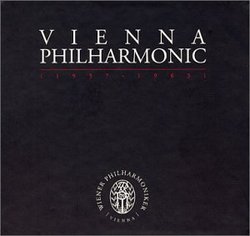A glorious collection of live VPO performances
07/18/2004
(4 out of 5 stars)
"I have to disagree with the previous reviewer. While it is true that the sound is not up to modern standard, that is not what one buys this set for. The Mitropoulos 9th has the worst sound, but it is an electrifying performance by a master conductor who would be dead within one month. Boehm's Strauss performances are invaluable given his close relationship to the composer, even if they are a bit too swift and objective for my taste. The Karajan Bruckner 8th is excellent, even if it is topped by at least one of his studio sets. I love Andante's documentation, and the sense of history that accompanies these performances. If you have a special interest in the Viennese orchestra style, or any of these conductors, you will love this set."
A Mixed Bag
D. J. Zabriskie | Park Ridge, NJ USA | 06/12/2005
(4 out of 5 stars)
"This collection is a very mixed bag, both in terms of sound quality and in terms of content. I guess you have to be a real German culture fanatic to appreciate it fully.
It's peculiar how so many Mahler fans detest Bruckner, and vice versa, despite both composers' love of large orchestral canvasses, their unmatched genius with the brass sections, etc. Bruckner lovers despair of Mahler's "progressive tonality," his almost-pantheistic existentialism and his fondness for slopping things up with musical banalities. Mahler fans, by contrast, hear in Bruckner's music vague streams of melody sitting atop a mound of harmonic sludge. So people who will buy this for the magnificent architecture of Brukner's 8th, so carefully delineated by von Karajan, are likely to be rebuffed by the magnificent realization of Mahler's leave-taking in his 9th, as executed to near perfection by Mitropoulos. Although the playing is always what you would expect from the Vienna Philharmonic, the recorded sound is not up to snuff for the Mahler 9th, marring an otherwise brilliant performance. Indeed, once you've heard the way Mitropoulos conducts this symphony, you can't be satisfied with the way anybody else does it, including Leonard Bernstein.
What gets overlooked in the Mahler vs. Bruckner argument, unfortunately, are some really good performances of Strauss' "Todt und Verklarung" and "Ein Heidenlieben" by Karl Bohm. Bohm's approach to Richard Strauss is neither as heroic as Karajan's or as classical as Toscanini's. Lacking Karajan's gift for calculated emotion or the sheer electricity of Toscanini, he steers a middle course, presenting the music on its own terms and letting it speak for itself. It's not a brilliant conception, just a thoughtful one, and, as such provides a nice contrast to whatever way you're used to hearing these pieces interpreted.
There's some very solid music-making going on here, even though Karajan will not make a Bruckner fan out of anyone who already isn't one already, the limitations of the recorded sound spoil an otherwise brilliant Mahler 9th, and Bohm sticks steadfastly to a "middle ground" with "his" Strauss."


 Track Listings (2) - Disc #1
Track Listings (2) - Disc #1